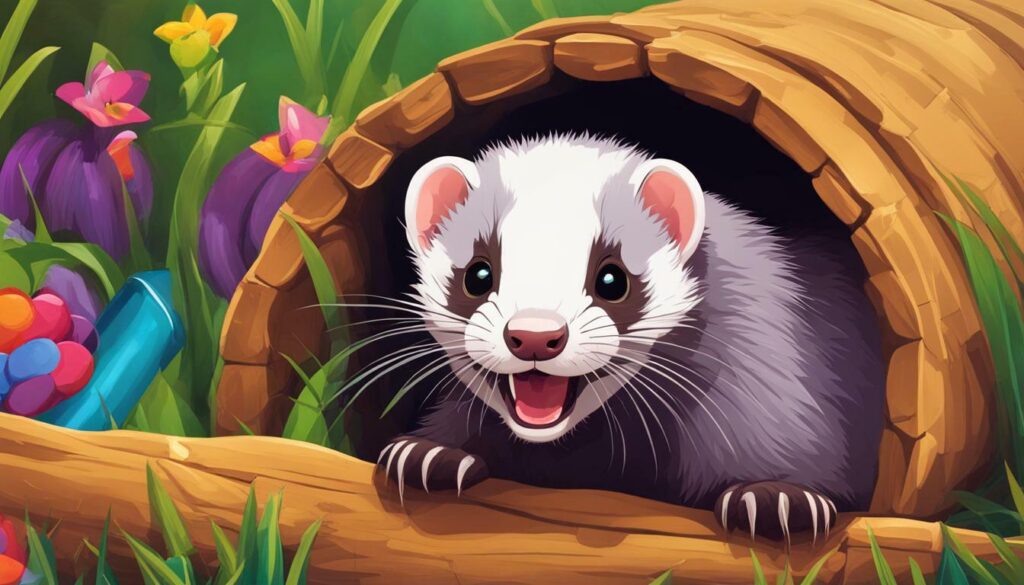Proper nutrition is essential for maintaining the health of your feathery friend, as inadequate diet accounts for 80-90% of bird diseases. Providing a balanced diet and necessary supplements is crucial for the overall well-being of your pet bird.
Key Takeaways:
- A dry seed diet alone is insufficient, lacking essential nutrients like calcium, amino acids, and vitamins.
- Pelleted avian diets, such as Harrison’s, Kaytee, and Zupreem, should make up 60-80% of a bird’s diet, providing balanced nutrition.
- Fresh foods should be incorporated daily, including vegetables like kale, carrots, and broccoli, as well as fruits like apples and grapes.
- Protein sources such as eggs, legumes, and low-fat cheese should be given in limited amounts.
- Birds on a seed diet should receive daily supplements containing essential vitamins, minerals, and amino acids.
The Impact of Diet on Bird Health
A dry seed diet alone is insufficient for your bird’s health, as it lacks crucial nutrients like calcium, amino acids, and vitamins. Proper nutrition is key in maintaining a healthy bird, as about 80-90% of bird diseases are related to an inadequate diet. To ensure optimal health and well-being, it is important to provide a balanced and varied diet for your feathered friend.
Avian diets that consist solely of dry seeds do not provide the necessary nutrients for birds to thrive. These diets may lead to deficiencies, impacting the bird’s overall health and immune system. Instead, pelleted avian diets, such as Harrison’s, Kaytee, and Zupreem, are recommended as they offer a balanced combination of essential nutrients and should make up 60-80% of a bird’s diet.
Adding fresh foods to your bird’s diet is also crucial. Fresh vegetables like kale, carrots, and broccoli, as well as fruits like apples and grapes, provide additional vitamins and minerals that are vital for your bird’s health. These fresh foods should be incorporated daily to ensure a diverse and nutritious diet.
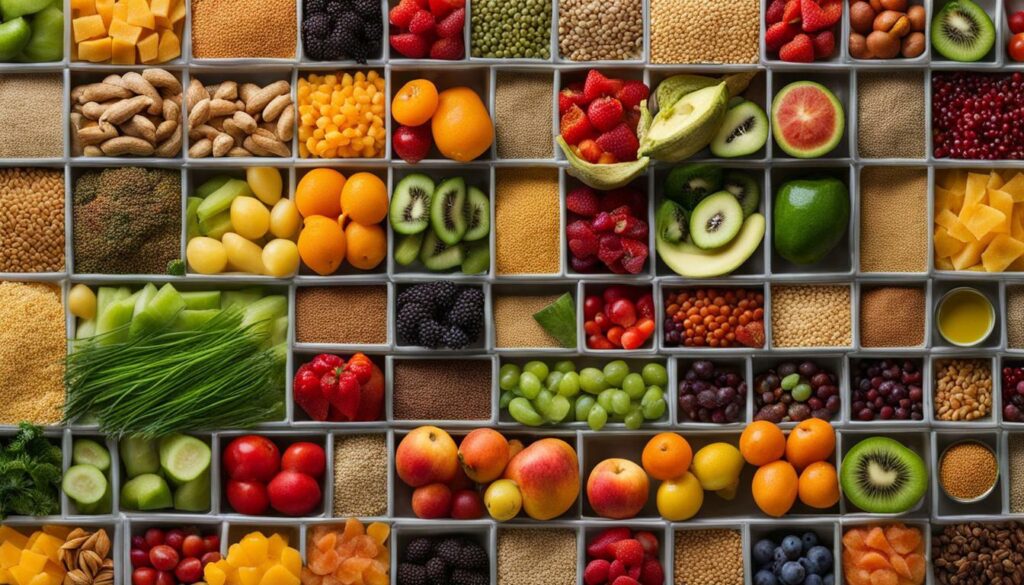
Protein sources such as eggs, legumes, and low-fat cheese should be given in limited amounts, as birds require lower amounts of protein compared to mammals. These protein sources offer essential amino acids for your bird’s well-being. Additionally, it is important to provide daily supplements containing vitamins, minerals, and amino acids to ensure that birds on a seed diet receive the necessary nutrients.
Recommended Avian Diets
Pelleted avian diets, such as Harrison’s, Kaytee, and Zupreem, provide the necessary balanced nutrition for your bird’s well-being. These trusted brands offer a variety of options specifically formulated to meet the nutritional needs of different bird species.
Avian diets play a crucial role in supporting your feathery friend’s health, ensuring they receive a well-rounded meal that includes all the essential nutrients. A balanced diet that consists of pelleted avian diets forms the foundation of your bird’s nutrition, providing them with the necessary vitamins, minerals, and amino acids they need to thrive.
When selecting an avian diet, it is important to consider the specific requirements of your bird species. Each brand offers a range of formulations tailored to different bird species, ensuring that your feathered companion receives adequate nutrition.
| Brand | Features | Primary Ingredients |
|---|---|---|
| Harrison’s | Organic, non-GMO | Whole grains, fruits, and vegetables |
| Kaytee | Wide variety of options | Seeds, grains, fruits, and vegetables |
| Zupreem | Pellets and natural flavors | Corn, soy, and wheat |
By incorporating these pelleted avian diets into your bird’s feeding routine, you can ensure they receive the balanced nutrition necessary for their overall well-being. However, it is important to note that fresh foods should also be an essential part of their diet.
Next, we will explore the importance of incorporating fresh foods into your bird’s diet, providing them with a diverse range of nutrients and flavors.
Incorporating Fresh Foods into the Diet
Daily inclusion of fresh foods, such as vegetables like kale, carrots, and broccoli, as well as fruits like apples and grapes, is crucial for your bird’s overall nutrition. While a pelleted avian diet provides balanced nutrition, incorporating fresh foods adds variety and essential nutrients that may be lacking in processed foods.
Vegetables are a great source of vitamins, minerals, and fiber for your feathered friend. Kale, rich in vitamin K and antioxidants, supports your bird’s immune system and promotes healthy digestion. Carrots, packed with beta-carotene, provide a vibrant orange color to their diet and contribute to good eye health. Broccoli, high in fiber and vitamin C, helps boost their overall well-being.
| Fresh Vegetables | Benefits |
|---|---|
| Kale | Supports immune system and digestion |
| Carrots | Good for eye health and colorful diet |
| Broccoli | High in fiber and vitamin C |
In addition to vegetables, incorporating fresh fruits into your bird’s diet provides natural sugars, antioxidants, and vitamins. Apples offer a satisfying crunch and are a good source of dietary fiber. Grapes, with their high water content and antioxidants, contribute to hydration and help support a healthy cardiovascular system.
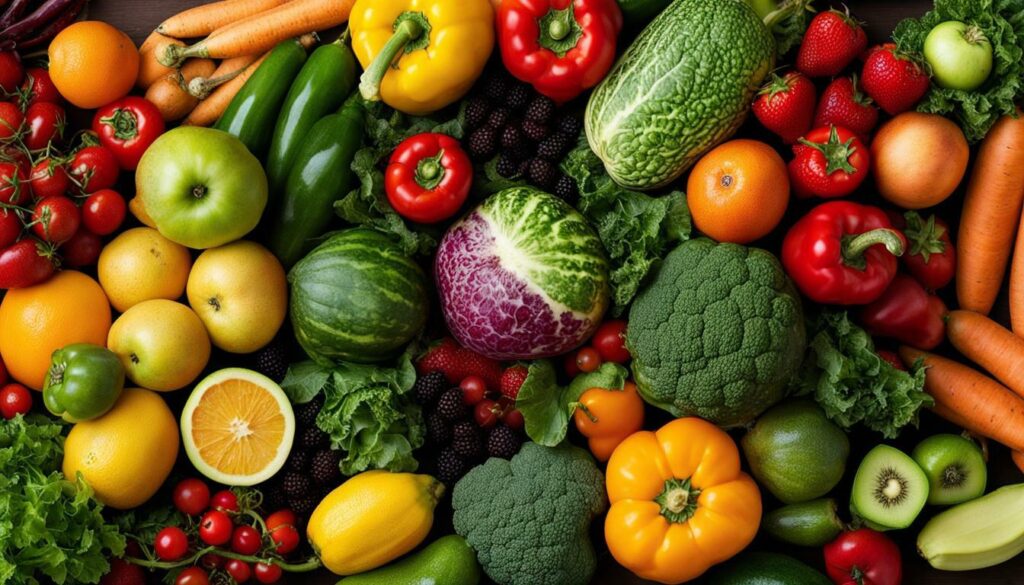
Remember to introduce fresh foods gradually and remove any uneaten portions within a few hours to prevent spoilage. It’s essential to monitor your bird’s response to new additions to their diet and make adjustments accordingly.
Quotes:
“Incorporating fresh foods into your bird’s diet not only provides essential nutrients but also adds variety and stimulates their natural foraging instincts.”
“Offering a colorful array of vegetables and fruits ensures that your bird receives a wide range of vitamins and minerals, promoting optimal health and longevity.”
“By including fresh foods in your bird’s daily diet, you can provide them with a diverse and exciting eating experience while supporting their overall well-being.”
By prioritizing the inclusion of fresh foods in your bird’s diet, you can provide them with a well-rounded nutritional foundation that enhances their overall health and happiness.
Limited Protein Sources
Birds should have limited protein sources in their diet, such as eggs, legumes, and low-fat cheese, to maintain optimal nutrition. While protein is an essential component of a bird’s diet for growth, muscle development, and overall health, it is important to provide it in controlled amounts.
Protein sources like eggs can be offered in small quantities, cooked thoroughly and without seasoning. Eggs are a good source of high-quality protein and essential amino acids, which are important for building and repairing tissues. Legumes, such as lentils and beans, are also excellent protein sources for birds. They provide a good balance of protein, fiber, and other nutrients. However, it is important to cook legumes thoroughly and avoid adding any seasonings or spices.
In addition to eggs and legumes, low-fat cheese can be a suitable protein source for birds. Cheese should be given in moderation due to its higher fat content. Opt for low-fat varieties and serve small portions to avoid excessive calorie intake.
| Protein Sources | Benefits |
|---|---|
| Eggs | High-quality protein, essential amino acids |
| Legumes | Protein, fiber, other nutrients |
| Low-fat cheese | Protein source, in moderation |
Remember to offer a variety of protein sources along with a well-balanced diet that includes other essential nutrients. Consulting with a veterinarian or avian nutritionist can help ensure that your bird’s diet meets its specific needs. Maintaining a healthy diet for your bird is key to promoting its overall well-being and preventing health issues.
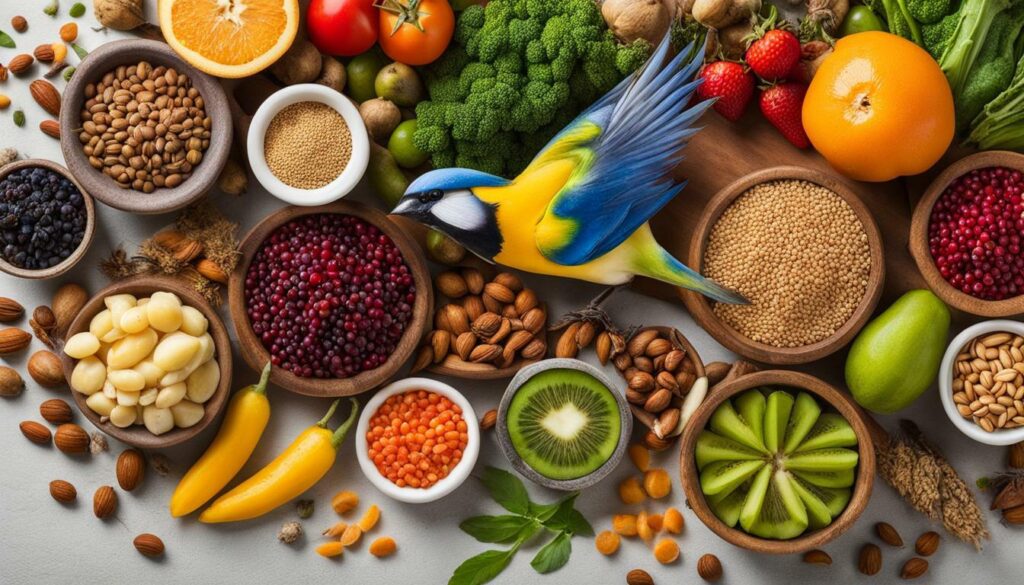
“Protein sources like eggs, legumes, and low-fat cheese should be given in limited amounts to maintain optimal nutrition for birds.”
Incorporating a variety of protein sources in your bird’s diet and providing them in controlled amounts will contribute to their overall health and nutrition. Remember, moderation is key to maintaining a well-balanced diet for your feathered friend.
Supplements for Birds on a Seed Diet
Birds on a seed diet should receive daily supplements containing essential vitamins, minerals, and amino acids to ensure their nutritional needs are met. A seed diet alone lacks the necessary nutrients for optimal health, leading to potential deficiencies and a higher risk of disease. By providing supplements, you can bridge the nutritional gap and support your bird’s overall well-being.
One of the key supplements for birds on a seed diet is a multivitamin that contains a wide range of vitamins and minerals. These supplements help compensate for the limited nutritional content of seeds and ensure that your bird receives the necessary micronutrients for optimal health. Look for a high-quality avian multivitamin that is specifically formulated for your bird’s species and size.
In addition to multivitamins, amino acid supplements are also important for birds on a seed diet. Amino acids are the building blocks of proteins and are essential for various bodily functions, including growth, immune function, and feather development. By providing amino acid supplements, you help support your bird’s muscle and tissue health, as well as promote healthy feather growth.
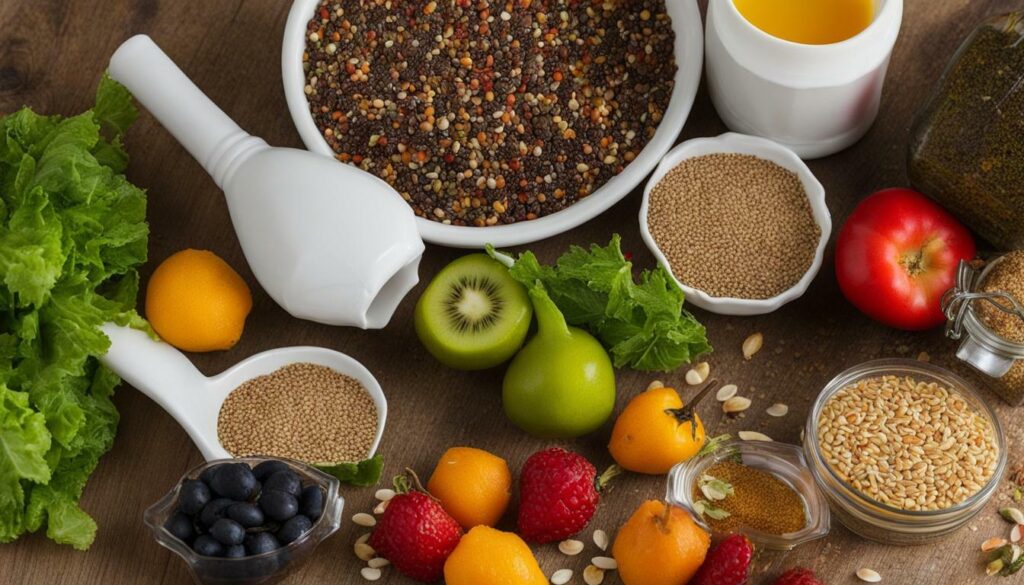
To ensure that your bird receives the correct dosage of supplements, it is essential to consult with a avian veterinarian. They can provide guidance on the appropriate supplements for your bird’s specific needs and advise you on the correct dosage and administration methods. Remember that excessive supplementation can also be harmful, so it’s important to follow the veterinarian’s recommendations.
Supplements are not a substitute for a balanced diet, but rather a complement to ensure your bird’s nutritional needs are met. By incorporating daily supplements into your bird’s routine, you can help promote their overall health and well-being, reducing the risk of potential deficiencies and related health issues.
Grit for Finches and Canaries.
While grit is unnecessary for most parrots, finches and canaries can benefit from a small amount of grit every few months. Grit is small, hard particles that birds consume to aid digestion. It helps grind up food in the gizzard, which is a muscular organ found in the bird’s digestive tract. The gizzard acts as a food processor, breaking down tough plant material and ensuring proper nutrient absorption.
When offering grit to finches and canaries, it’s important to provide the right type and in the appropriate amount. Parakeet or budgie grit, composed of finely ground oyster shells and small pebbles, is suitable for these birds. It should be offered sparingly, about a pinch every few months, as excessive consumption can lead to digestive issues.
Grit should be provided separately from other food, such as in a small dish or sprinkled on the cage floor. This allows the birds to consume it as needed. It’s important to monitor their intake and ensure they are not overeating or experiencing any adverse effects. If you notice any abnormal digestive issues or behavior, consult a veterinarian for guidance.
| Grit for Finches and Canaries | |
|---|---|
| Type | Finely ground oyster shells and small pebbles |
| Amount | A pinch every few months |
| Method | Provide in a separate dish or sprinkle on the cage floor |
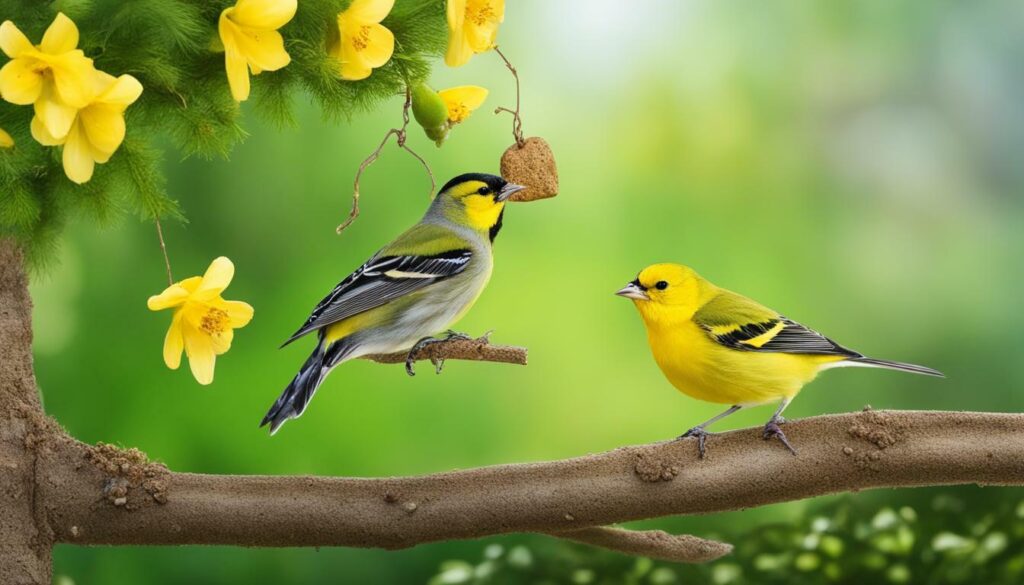
Feeding Guidelines and Precautions
To maintain your bird’s health, it’s important to remove uneaten fresh food within a few hours, introduce new foods gradually, and seek immediate treatment for any signs of illness. Fresh food left out for too long can spoil and harbor harmful bacteria, leading to digestive issues and potential illness for your bird. Regularly clean your bird’s feeding dishes to prevent contamination and promote good hygiene.
When introducing new foods to your bird’s diet, do so gradually to allow their digestive system to adjust. Birds can be hesitant to try new foods, and sudden changes can result in refusal or digestive upset. Start by offering small portions alongside their regular diet and gradually increase the amount over time. This method helps them familiarize themselves with new tastes and textures without causing any disruption to their overall health.
It’s crucial to pay close attention to any signs of illness in your bird. Birds are often good at hiding signs of illness, so it’s essential to be vigilant. Some common indicators of illness include changes in stool consistency, decreased appetite, fluffed feathers, sneezing, decreased activity or vocalization, weight loss, and runny nose or eyes. If you observe any of these symptoms, consult a veterinarian immediately for a proper diagnosis and appropriate treatment.
Immediate Treatment:
- Changes in stool consistency (diarrhea or discolored stool): Immediate veterinary attention is necessary, as this could indicate an underlying infection or gastrointestinal issue.
- Decreased appetite: Birds generally have good appetites, so a sudden decrease in food intake can be a sign of illness. Seek veterinary assistance for further evaluation.
- Fluffed feathers: Fluffing up their feathers is a sign that a bird is not feeling well. It could be a sign of stress, illness, or discomfort, so prompt veterinary care is crucial.
- Sneezing: While an occasional sneeze may be normal, frequent or persistent sneezing can indicate respiratory problems or allergies. Consult a veterinarian for a proper examination and diagnosis.
- Weight loss: Unexplained weight loss is concerning and could be a sign of various underlying health issues. Seek immediate veterinary attention to address the cause and prevent further complications.
Remember, being proactive in your bird’s health and nutrition is key to ensuring their well-being and longevity. By following these feeding guidelines and taking necessary precautions, you can provide your feathery friend with the best possible care.
| Sign of Illness | Possible Causes | Treatment |
|---|---|---|
| Changes in stool consistency | Infection, gastrointestinal issues | Immediate veterinary attention |
| Decreased appetite | Illness, stress | Consult a veterinarian |
| Fluffed feathers | Stress, illness, discomfort | Prompt veterinary care |
| Sneezing | Respiratory problems, allergies | Consult a veterinarian |
| Weight loss | Underlying health issues | Immediate veterinary attention |
Signs of Illness in Birds
It’s crucial to be aware of the signs of illness in birds, which may include changes in stool, decreased appetite, fluffed feathers, sneezing, weight loss, and other symptoms. Proper nutrition is essential for maintaining a healthy bird, as 80-90% of bird diseases are related to an inadequate diet. A dry seed diet alone is insufficient, as it lacks essential nutrients like calcium, amino acids, and vitamins.

Pelleted avian diets, such as Harrison’s, Kaytee, and Zupreem, provide balanced nutrition and should make up 60-80% of a bird’s diet. These diets ensure that birds receive the necessary vitamins, minerals, and amino acids for optimal health. Additionally, fresh foods should be incorporated into your bird’s daily diet. Vegetables like kale, carrots, and broccoli, as well as fruits like apples and grapes, offer important nutrients and variety to their meals.
When it comes to protein sources, birds should be given options like eggs, legumes, and low-fat cheese in limited amounts. These sources provide the necessary protein without overloading their diet. Birds on a seed diet should receive daily supplements containing vitamins, minerals, and amino acids to compensate for any deficiencies in their diet.
Feeding Guidelines and Precautions
- Remove uneaten fresh food within a few hours to prevent spoilage and bacterial growth.
- Introduce new foods gradually to give your bird time to adjust to different flavors and textures.
- Monitor your bird’s behavior and appetite for any signs of illness, such as decreased activity or vocalization.
- If you notice any of the signs of illness mentioned earlier, seek immediate veterinary attention.
Remember that the ideal avian diet consists of a balanced combination of seeds, pellets, and fresh fruits and vegetables. Home-cooked meals can also be made for birds using ingredients like Nutri-Berries, pancake batter, and cornbread mix to provide a variety of nutritious options. Healthy snacks, such as popcorn Nutri-Berrie treats, rice cakes, whole-wheat bread, and no-salt-added whole-wheat crackers, can be given occasionally but should make up no more than 10% of a bird’s diet.
By being mindful of your bird’s nutrition and watching for signs of illness, you can ensure that your feathery friend enjoys a long and healthy life.
| Signs of Illness in Birds | Possible Reasons |
|---|---|
| Changes in stool | Gastrointestinal issues, parasites, or infection |
| Decreased appetite | Possible illness or discomfort |
| Fluffed feathers | Sign of illness or stress |
| Sneezing | Respiratory infection or irritation |
| Weight loss | Possible illness or poor diet |
The Ideal Avian Diet
The ideal avian diet consists of a balanced combination of seeds, pellets, and fresh fruits and vegetables to ensure your bird’s nutritional needs are met. Proper nutrition is crucial for maintaining a healthy bird, as 80-90% of bird diseases are related to an inadequate diet. While seeds may be a favorite among birds, a dry seed diet alone is insufficient because it lacks essential nutrients like calcium, amino acids, and vitamins.
Pelleted avian diets, such as Harrison’s, Kaytee, and Zupreem, are recommended to provide balanced nutrition and should make up 60-80% of your bird’s diet. These pelleted diets are formulated to contain all the necessary vitamins, minerals, and amino acids that your feathery friend needs for optimal well-being. They come in various flavors and sizes to cater to different bird species and preferences.
In addition to pellets, fresh foods should be incorporated into your bird’s diet on a daily basis. This includes a variety of vegetables like kale, carrots, and broccoli, which provide essential vitamins and minerals. Fruits like apples and grapes can also be offered as a tasty and nutritious treat for your bird.
To ensure a well-rounded diet, it’s important to limit protein sources such as eggs, legumes, and low-fat cheese. While protein is an important component of a bird’s diet, excessive amounts can lead to health issues. These protein sources should be given in moderation, as recommended by avian veterinarians.
Remember, a balanced avian diet also includes daily supplementation for birds on a seed-based diet. Supplements containing essential vitamins, minerals, and amino acids should be provided to address the nutritional gaps in a seed diet. These supplements help support your bird’s overall health and prevent deficiencies.
| Seeds | Pellets | Fresh Fruits and Vegetables |
|---|---|---|
| A variety of seeds like millet, sunflower, and safflower can be offered to add texture and taste to your bird’s diet. | High-quality pelleted avian diets, such as Harrison’s, Kaytee, and Zupreem, provide balanced nutrition for your bird. | A mix of fresh fruits and vegetables like kale, carrots, and apples should be offered daily to provide essential vitamins and minerals. |
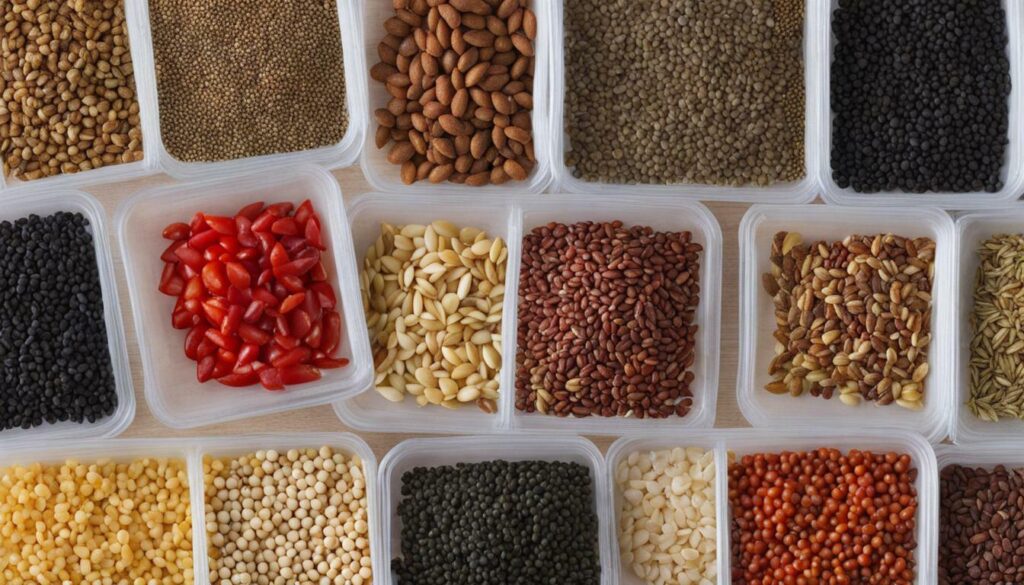 | 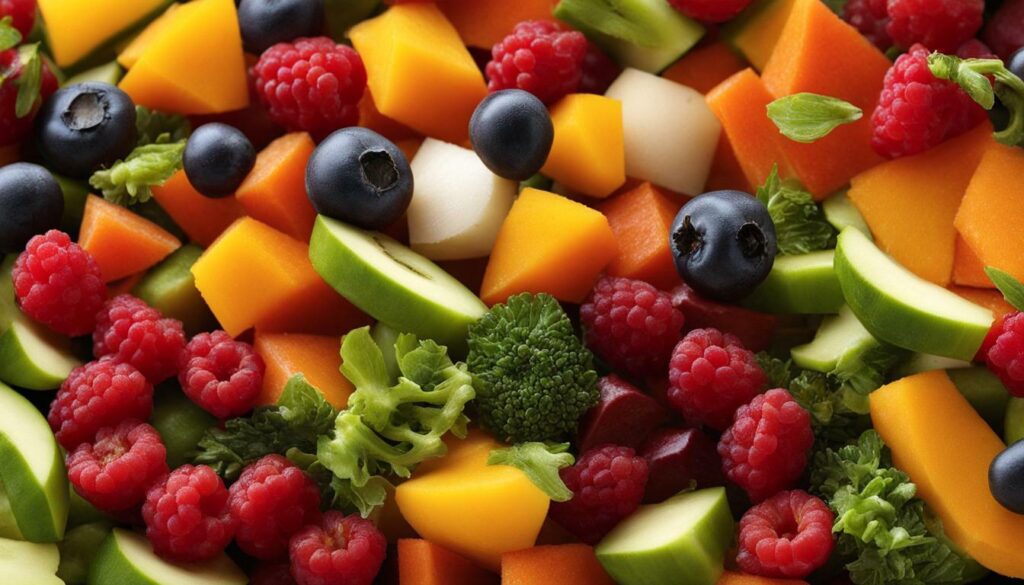 | 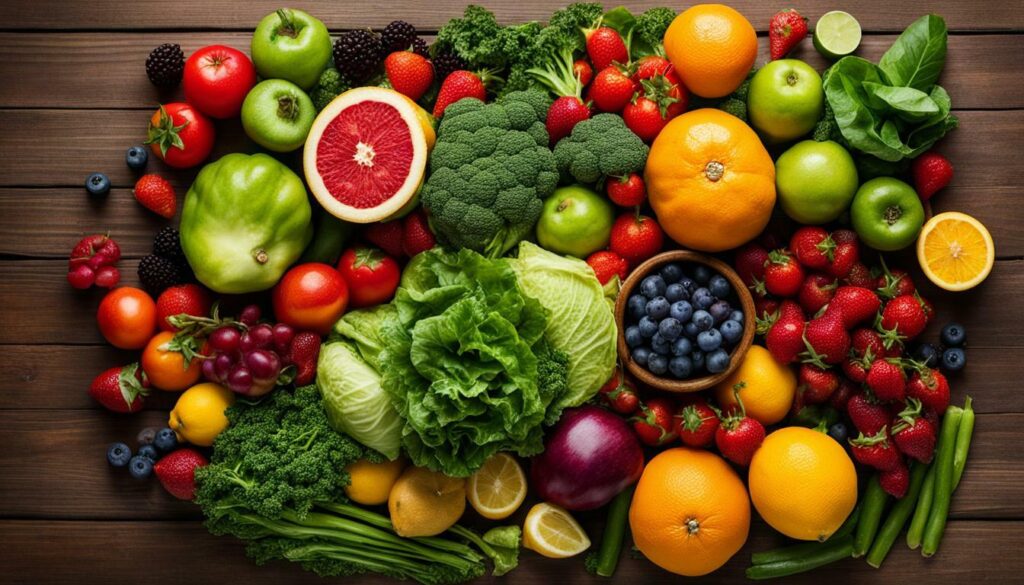 |
By following the ideal avian diet, you can ensure that your feathery friend receives the necessary nutrients for a long and healthy life. Remember to always consult with an avian veterinarian for specific dietary recommendations based on your bird’s species and individual needs.
Home-Cooked Meals for Birds
In addition to commercial diets, you can prepare home-cooked meals for your bird using ingredients like Nutri-Berries, pancake batter, and cornbread mix. These meals provide a variety of nutrients and flavors that can complement your bird’s diet and keep them happy and healthy. When preparing home-cooked meals, it’s important to ensure that you are using safe and nutritious ingredients.
One option for home-cooked meals is Nutri-Berries, which are nutritious and convenient treats that come in a variety of flavors. They are made with real fruits, nuts, and seeds, providing your bird with a tasty and balanced meal. Nutri-Berries are an excellent source of vitamins, minerals, and essential fatty acids, making them a great addition to your bird’s diet.
Another ingredient you can use in home-cooked meals is pancake batter. Pancake batter can be made from scratch or purchased pre-made. It can be mixed with grated vegetables and cooked into small patties that can be served to your bird. This provides a homemade alternative to commercially available bird treats.
Lastly, cornbread mix can be a great base for home-cooked meals. You can add vegetables, fruits, and even small pieces of cooked meat to the mix, creating a nutritious and flavorful meal for your bird. Be sure to bake the cornbread thoroughly and allow it to cool before serving it to your feathery friend.
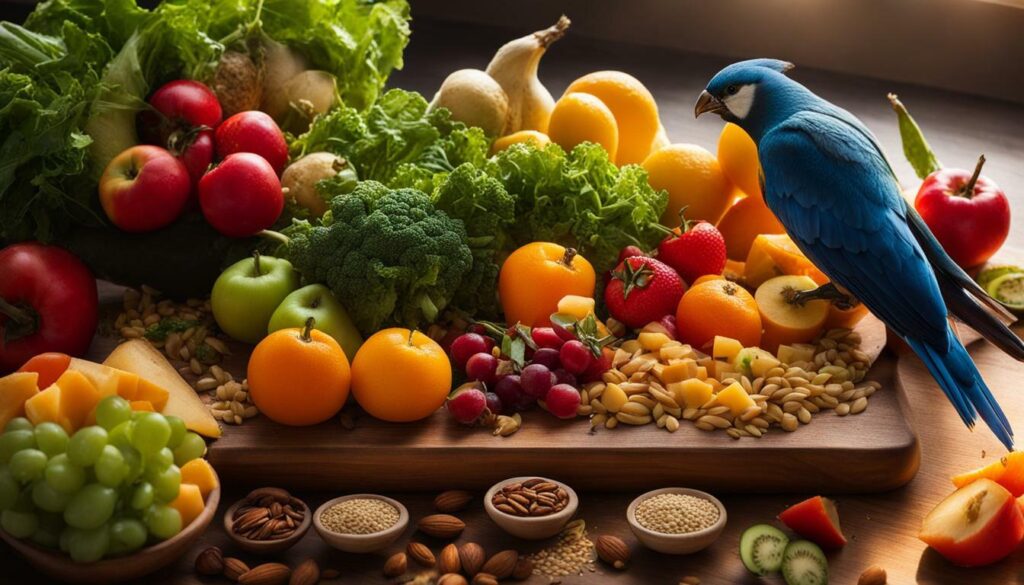
When preparing home-cooked meals for your bird, it’s important to remember that they should not make up the entire diet. Commercial diets, such as pellets and seeds, should still make up the majority of their food intake. Home-cooked meals should be offered as occasional treats or as a way to add variety to their diet.
By incorporating home-cooked meals into your bird’s diet, you can provide them with a nutritious and flavorful alternative to their regular food. Remember to always consult with your avian veterinarian before making any significant changes to your bird’s diet to ensure that they are receiving the proper nutrition they need.
Healthy Snacks for Birds
You can treat your bird to healthy snacks like Nutri-Berrie treats, rice cakes, whole-wheat bread, and whole-wheat crackers, keeping in mind that snacks should be limited to no more than 10% of their overall diet. Proper nutrition is crucial for maintaining a healthy bird, as 80-90% of bird diseases are related to an inadequate diet. A dry seed diet alone is insufficient, as it lacks essential nutrients like calcium, amino acids, and vitamins.
Pelleted avian diets, such as Harrison’s, Kaytee, and Zupreem, provide balanced nutrition and should make up 60-80% of a bird’s diet. These diets offer a convenient way to ensure your feathery friend receives the necessary nutrients for optimal health. However, it’s important to supplement their diet with fresh foods, which should be incorporated daily.
Fresh foods include a variety of vegetables like kale, carrots, and broccoli, which provide essential vitamins and minerals. Fruits like apples and grapes also offer a tasty and nutritious addition to their diet. These fresh foods not only provide additional nutrients but also add variety and enrichment to their meals.
When it comes to protein sources, it’s important to offer limited amounts to your bird. Options like eggs, legumes, and low-fat cheese can be provided as occasional treats, ensuring they don’t make up a significant portion of their diet. Moderation is key when it comes to protein sources, as excessive amounts can lead to health issues in birds.
FAQ
Q: Why is proper nutrition important for birds?
A: Proper nutrition is crucial for maintaining a healthy bird, as 80-90% of bird diseases are related to an inadequate diet.
Q: Is a dry seed diet sufficient for birds?
A: No, a dry seed diet alone is insufficient, as it lacks essential nutrients like calcium, amino acids, and vitamins.
Q: What are some recommended avian diets?
A: Some recommended avian diets include Harrison’s, Kaytee, and Zupreem, which provide balanced nutrition and should make up 60-80% of a bird’s diet.
Q: How can I incorporate fresh foods into my bird’s diet?
A: Fresh foods should be incorporated daily, including a variety of vegetables like kale, carrots, and broccoli, as well as fruits like apples and grapes.
Q: What are some limited protein sources for birds?
A: Limited protein sources for birds include eggs, legumes, and low-fat cheese, which should be given in limited amounts.
Q: Do birds on a seed diet need supplements?
A: Yes, birds on a seed diet should receive daily supplements containing vitamins, minerals, and amino acids.
Q: Should finches and canaries be given grit?
A: Grit is unnecessary for most parrots, but finches and canaries can benefit from a small amount of grit every few months.
Q: How should I feed my bird and what precautions should I take?
A: Remove uneaten fresh food within a few hours to prevent spoilage, introduce new foods gradually, and do not starve your bird into eating something new. Signs of illness in birds include changes in stool, decreased appetite, fluffed feathers, sneezing, decreased activity or vocalization, weight loss, and runny nose or eyes. Immediate treatment is necessary when signs of illness are visible.
Q: What are some common signs of illness in birds?
A: Common signs of illness in birds include changes in stool, decreased appetite, fluffed feathers, sneezing, decreased activity or vocalization, weight loss, and runny nose or eyes.
Q: What does the ideal avian diet consist of?
A: The ideal avian diet includes a balanced combination of seeds, pellets, and fresh fruits and vegetables.
Q: Can I make home-cooked meals for my bird?
A: Yes, you can make home-cooked meals for birds using ingredients like Nutri-Berries, pancake batter, and cornbread mix for a variety of nutritious options.
Q: What are some healthy snacks for birds?
A: Healthy snacks for birds include popcorn Nutri-Berrie treats, rice cakes, whole-wheat bread, and no-salt-added whole-wheat crackers. However, snacks should make up no more than 10% of a bird’s diet.






